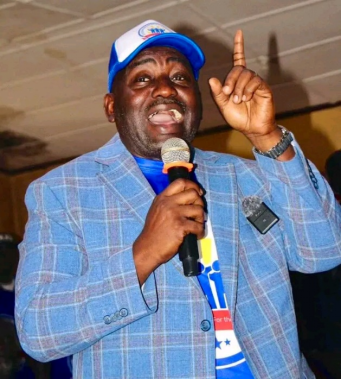Musa Hassan Bility, a prominent Liberian political figure and representative of Nimba County District #7, has launched a blistering critique of President Joseph Nyuma Boakai and Vice President Jeremiah Koung, accusing them of fostering tribalism and exacerbating national divisions. Bility’s accusations, presented in a public letter titled “Letter from Saclepea: Lofa and Nimba, the Tale of Two Leadership,” draw a stark comparison between the leadership styles of the two highest-ranking officials, highlighting what he perceives as their contrasting approaches to governance and their impact on their respective counties.
Bility acknowledges President Boakai’s consolidation of power in Lofa County, despite what he terms the president’s “tribal instincts.” He notes that Lofa, a significant and well-educated county, has consistently supported Boakai even after facing initial opposition from key political figures within the county. Bility attributes this to Boakai’s effectiveness in unifying his base, stating that regardless of one’s opinion of his methods, the president has successfully solidified his political stronghold in Lofa. This consolidation, Bility implies, stands in stark contrast to the situation in Nimba County.
In contrast to President Boakai’s approach, Bility accuses Vice President Koung of presiding over Nimba County in a “miserable” manner. He alleges that Koung has sown discord, suppressed dissent, and marginalized independent-minded leaders within the county. Bility names several prominent Nimba figures, including himself, Edith Gongloe, and Samuel Kogar, claiming they have been sidelined for exhibiting independent thought. He further contends that even Koung’s former allies have faced humiliation and ostracization. This, according to Bility, paints a picture of a divisive leadership style that undermines unity and progress within Nimba.
Bility’s accusations extend to claims of targeted harassment against his own political and business interests. He alleges that Vice President Koung has employed local officials, including the county superintendent, to disrespect and denigrate lawmakers, and has orchestrated harassment against his private ventures. These actions, Bility asserts, are indicative of Koung’s abuse of power and further contribute to the atmosphere of division and intimidation within Nimba. Despite these alleged pressures, Bility declares his resolve to resist and speak out against what he perceives as divisive politics.
The core of Bility’s argument rests on the contrasting narratives of Lofa and Nimba. He portrays Lofa as a county unified under President Boakai, despite the president’s purported flaws, while Nimba is presented as a county fractured by Vice President Koung’s leadership. Bility frames this dichotomy as a tale of redemption versus betrayal, emphasizing the historical implications of these contrasting leadership styles. He concludes his letter with a strong condemnation of the Vice President’s actions, predicting that history will judge him harshly for his alleged betrayal of the people of Nimba.
Bility’s public letter has ignited controversy and deepened the existing political fissures within Liberia. The accusations against the president and vice president represent a significant escalation of tensions between the ruling party and emerging opposition voices. As of yet, neither the Office of the President nor the Vice President has issued a public response to Bility’s claims. Political analysts suggest that this silence further fuels speculation and contributes to the growing uncertainty surrounding the country’s political landscape. The lack of official response leaves the accusations hanging in the air, allowing them to resonate and potentially further inflame existing tensions. The unfolding situation underscores the fragility of Liberia’s political climate and the potential for further escalation in the lead-up to future elections.


